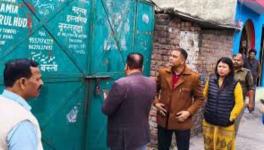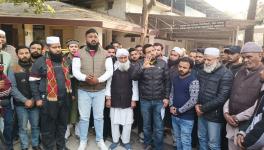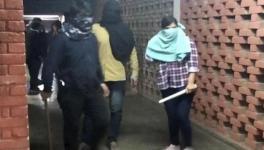Two Shades of Khaki: Failing JNU Students, Curbing Meerut’s Muslims
Shattered and shell-shocked. That was the mood a day after the campus attack. Jawaharlal Nehru University, India’s premier institute, located at the heart of the capital was the scene of a violent attack. On Sunday evening, marauders armed with lathis and hammers ran through the university, attacking teachers and students, ransacking hostel rooms, shattering windows, while the police silently watched from the main North gate of the university, giving cover to the mob. Street lights were out to make it easier for the attackers.
The police refused to enter JNU without permission from the authorities. This is the same police force that entered Jamia Millia Islamia last month. It had breached the university’s library, dragged students out of the toilets and beat them mercilessly. It justified this raid, saying it was to restore peace in Jamia. But in JNU, teachers and students begged the police to come to their rescue, but their desperate pleas fell on deaf ears.
What happened on Sunday has forever broken the sense of security that generations of students had felt inside JNU’s campus. Student after student said that JNU had always been their “secure space”. Most of the young were now reluctant to speak on record or reveal their names, for fear that they could be targeted. Despite agitations, fierce arguments and, in recent years, angry exchanges between the Akhil Bharatiya Vidyarthi Parishad (ABVP) and the Left unions, violence was unheard-of in the past. Attempt to change the institution’s liberal ethos have been going on since 2014, but nothing so crude or cruel had ever happened.
“JNU has always been home to us. The authorities want to break the foundations of the university. This is a place which every student who passed the entrance test was welcomed without discrimination over caste, creed or gender. It is this ethos that they want to destroy,” says Sucheta Talukdar, 21, a student activist who is known for being vocally against the fees hike that the university administration announced in November 2019. On Sunday, when the violence started, she and her friends ran to the university dhaba, a place where students regularly gather. Her friends hid her under the sink, knowing full well that the attackers would seek her out and target her.
According to the students, the entire attack was targeted. Activists from the Students’ Federation of India (SFI), the Indian Students Association (ISA) and the room numbers of Muslims and Dalits, were available to the mob. Not just ABVP members, goons accompanying them from outside were involved in the rampage. For instance, the room occupied by a Kashmiri PhD student in the Sabarmati Hostel was ransacked. This student has had a tough time ever since Article 370 was scrapped by the central government.
He was regularly subjected to jeers and taunts by ABVP activists in the university. But on Sunday, when students realised that the mob was heading for the hostel, they quickly ran upstairs, locked the door to his room and made him jump out through the balcony, and hide. It is lucky that they did so because moments later the mob headed for his very room, and finding it locked, still broke the lock and lay waste to it.
The fact is that the violence in JNU could have been controlled if the Delhi police had not shrugged off its responsibility. But in their desire to please the ABVP, which is the student wing of the Rashtriya Swayamsevak Sangh or RSS, which, in turn, is the ideological parent of the ruling Bharatiya Janata Party, they brushed aside their responsibility towards those who needed protection.
The other side of the coin is Meerut, where an overactive police force has contributed to bring the situation to a boil. Five people have been killed in the city, allegedly in police firing, though the police deny this.
The violence in Meerut took place on 20 December 2019. Yet, when I visited Lisari Gate, a Muslim locality in the outskirts of the city, in the first week of January 2020, fear still gripped the impoverished crowded neighbourhood. Fear was palpable in each nook and crevice of the locality, where houses jostle against each other in narrow lanes and alleys. The fear in Lisari Gate was not of unknown mobs, but of the men in khaki.
According to people here, there were no call for protests against the All-India National Register of Citizens (NRIC) or the Citizenship Amendment Act (CAA), 2019, that day. Though protests were taking place at the time in many parts of the country and in Uttar Pradesh, nothing was planned in the Lisari Gate area. Fifteen-year-old Mohammed Ubaid and thirteen-year-old Danish were coming out of the mosque after Friday prayers along with other worshippers when they saw police barricades set up on the main road leading out of the masjid.
The police were everywhere on the main street. As a group of worshippers wearing black arm bands were passing by, the police turned suddenly and began attacking them with batons. Whether there was an altercation between the police and the group of men wearing armbands is not clear. There was panic and people began to run into the by-lanes. Some youngsters pelted stones at the police. When stones were hurled, the police used tear gas and chased crowds into the lanes. Soon enough, gunfire echoed through the smoke and noise of people shouting and running. Both Ubaid and Danish were able to return home safely.
Zaheer Ahmed, 45, was one of the victims, but he had not gone for prayers that afternoon. Ahmed earned his livelihood by selling cattle fodder. He was preparing to go for a wedding and had stepped out of the house to buy biri that fateful day. He sat on the ledge of the tiny shop to smoke when he fell to a bullet, allegedly fired by the police as they entered the lane he was in while chasing the crowd. A friend and neighbour on the opposite side of the shop saw Zaheer fall, but did not realise he had been shot dead.
Zaheer’s wife and daughter refuse to speak to journalists though neighbours gathered around and narrated their story. His body was taken to the hospital for the post mortem. By early morning, the body was returned to the family and they were asked to quickly bury him, fearing violence during the funeral.
The other victim in Lisari Gate was Mohammed Mosim, 28, who collected and sold scrap. Mosim has left behind his young wife and two son’s, aged three and six months. The family is in shock as Mosim was killed while returning home from the masjid and had stopped to buy cattle feed. There were gunshot wounds on his person and the family has not been given his post mortem report. To add insult to injury, a case has been filed against Mosim for rioting.
The men in the locality no longer sleep at night. Instead they keep vigil at every by-lane in the area, worried about midnight knocks by the police. Men sit around a bonfire at the head of every narrow lane, making sure that if the police do come to pick up youngsters, people in the locality are aware.
Like in other towns in Uttar Pradesh, the Meerut police is hyperactive. They have already drawn up lists of people who indulged in “rioting” on 20 December. Unlike what the people of Lisari Gate have said, the police claim that there was a planned protest by Muslims against the NRIC and CAA. People poured onto the streets after Friday prayers, angrily shouting slogans and began pelting stones at the police. Many policemen were injured and they had to use tear gas and controlled the violent mob after several lathi charges.
Protesters came armed with guns and began shooting indiscriminately, the SSP of Meerut, Ajay Sahni, says. The dead were caught in the cross-fire he claimed, as the police had not fired. Sahni showed several enlarged photographs of people carrying guns. Their authenticity remains in question. He also claimed that 30 police personnel were locked in a shop near City Hospital. They would have been burnt alive if other police men did not rescue them, the SSP claimed.
FIRs have been lodged by the police against “rioters” in two police stations. One names 41 persons, and the other names 56. In addition, notices will be sent demanding compensation from those who “destroyed public property”. The SSP was caught on camera hurling abuses at Muslims and asking them to “go to Pakistan”. With this kind of biased officers leading Meerut police, what justice can people expect?
Muslims have reason to be concerned. Dr Ezaz Ahmed, a 47-year old doctor, has made looking after the poor and illiterate inhabitants of Lisari Gate his mission. “They are utterly helpless,” he says. With the Yogi Adityanath government in power in Uttar Pradesh, it will be difficult for the community to get justice. The sad fact is that the people here have no one to speak for them.
Neither Mayawati’s Bahujan Samaj Party nor Akhilesh Yadav’s Samajwadi Party have bothered to stand with the community which has voted for them often, even in the recent past. Congress leaders Rahul and Priyanka Gandhi tried to visit the site, but were turned away by the Meerut police. “Our rights are being snatched away. Muslims have fought and sacrificed for this country, but none of this seems to matter any more,” says Ahmed.
The police in this country continue to please their political masters, whichever government may be in power. So while in Uttar Pradesh the police are being overzealous and playing a proactive part when it comes to targeting Muslims, in Delhi the police look the other way and cannot file a single charge-sheet against the mob that attacked the JNU campus. Instead, an FIR is being lodged against Aishe Ghosh, who heads the JNU student union, after complaints from the JNU administration.
The author is a freelance journalist. The views are personal.
Get the latest reports & analysis with people's perspective on Protests, movements & deep analytical videos, discussions of the current affairs in your Telegram app. Subscribe to NewsClick's Telegram channel & get Real-Time updates on stories, as they get published on our website.
























